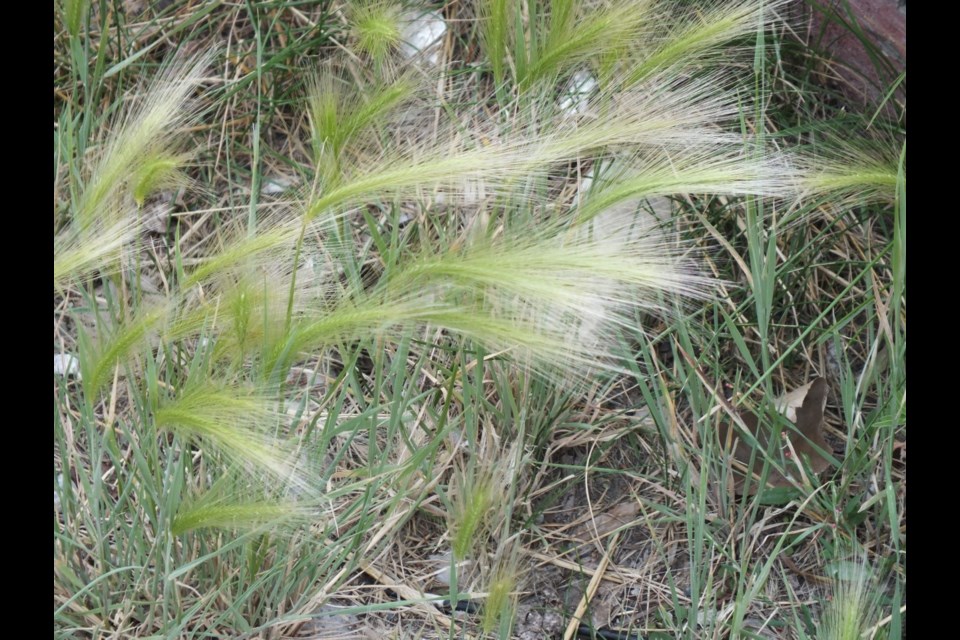Foxtail barley is a weed native to Alberta that’s become prevalent this year, thriving in disturbed and saline soil, especially when it doesn't have a lot of competition from other weeds.
It can be spotted in empty fields and construction sites, or any small area where there’s little other competition. This year, foxtail has been particularly abundant due to the warm, dry weather.
Karen Falk sees it all over Cochrane, and when she does, she springs into action with her rubber gloves, garbage bag, and a determination to make a difference.
The Eagle spotted Falk hard at work pulling foxtail barley weeds on a hot day last week, and she was more than willing to share the story of why she does what she does.
“These plants are a real problem for animals – any animal that has its nose down,” she said.
According to Falk, the plant’s barbed seeds can lodge into curious dogs’ or cats’ mouths, paws, noses and skin, causing them pain and discomfort. The barbed seed head, called an awn, can get stuck in a dog's fur.
The foxtails’ tough seeds don’t break down inside the body, so an embedded seed can lead to a serious infection. If it gets up a pet’s nasal cavity, it's very difficult to get out, and can result in a costly vet bill.
Falk has been on a one-woman mission against noxious plants for years now. She patrols town two or three days a week with her garage bag in tow. She’d be out more often, but said she has a surgery coming up that prevents her from doing more.
She spends time walking her dog in popular dog-walking areas in town, pointing out areas where people need to be careful.
She’d added she’d like to see more of her fellow Cochrane residents get involved in her cause.
“How much time does it take to pull weeds?” she asked. “People think someone else will do it – just do it yourself. They’re easy to pull up.”
Foxtail barley is not a listed species on the Alberta Weed Control Act.
Even so, Jaime Anton, Operations Manager at the Cochrane and Area Humane Society, said foxtails are a serious concern.
“We always recommend, if you can avoid them, certainly avoid them,” she said. “Keeping your dog’s fur shorter also helps.”
Anton said it’s good practice this time of year to check your dog’s feet, ears, and mouth after walks, to make sure nothing is stuck anywhere.
“They have those barbed seeds that get lodged in their mouths, paws, ears, things like that,” she said.
“It’s very important to keep an eye on your dog – note if they’re licking or pulling or seem agitated with that. And certainly take them to the vet if there’s something lodged in there.”
Anton said it can be a very expensive trip to the vet when a lodged seed leads to swelling and infection. She said they have a volunteer at the humane society who does a ‘1,000 Foxtail challenge’ where she picks 1,000 foxtails and encourages other volunteers to do the same.
Falk describes herself as a dog-lover who also happens to be passionate about stewardship of the land. She used to pasture horses north of Cochrane, where she saw just how much damage foxtails can do in rural settings.
“I know that it can get into a pasture and degrade the quality of your crop, and of course you don’t want your animals with their noses down in it,” she said.
“It’s important to take care of your land, whether it’s in town or anywhere – we only have so much land.”
Falk said she has approached the Town of Cochrane about increasing surveillance and control of noxious weeds, with little or no success to date.
“It’s just being sloppy,” she said. “Let’s do something better than what Calgary and other places do.”


